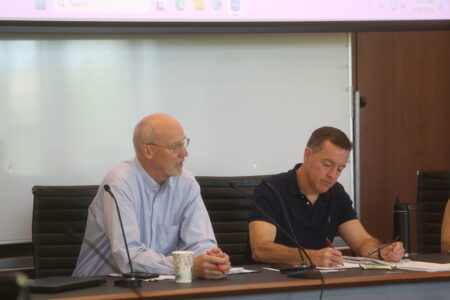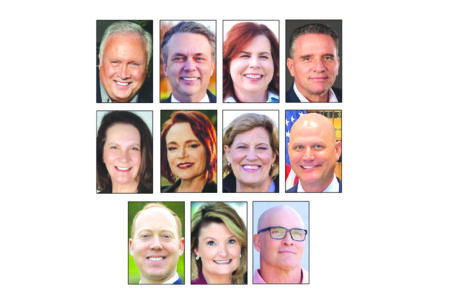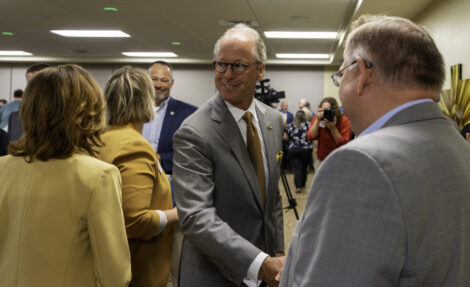Questions loom on whether state lawmakers can cut property taxes and pay for public schools
Tax proposals include capping valuation increases, raising exemption levels

photo by: Celia Llopis-Jepsen / Kansas News Service
A school bus is pictured in front of the Kansas Statehouse in Topeka in this file photo.
At the June 27, 2024, meeting of the Wyandotte County Board of Commissioners, community members in attendance were upset for at least two reasons.
First, the commissioners were late to their own meeting. One commenter said they had waited 45 minutes for the meeting to start.
The second cause for indignation was a proposal to exceed “revenue neutral” in the following year’s budget — government-speak for raising property taxes.
Tori Walker, a music teacher, said her home in the Morris neighborhood was affordable when she bought it five years prior. That changed, she said, when the “lurking monster” of property taxes reared its head.
“Any extra money I make this summer with little side jobs won’t really benefit my family,” she said. “I won’t be able to pay it toward debt, or toward savings, or even maybe to go to the pool or buy school supplies. No, I’ll be paying it to Wyandotte County.”
After three hours and dozens of testimonies like Walker’s, applause rang out when the commission voted unanimously against its proposal to hike property taxes.
And Commissioner Chuck Stites apologized for the delayed start to the meeting.
What would cuts cost?
Required public hearings like this have taken place across the state of Kansas as residential property tax rates have ballooned. Last year’s drawn-out battle over a sweeping tax cut package did not include the level of property tax relief many had wanted. This year, lawmakers on both sides of the aisle say they want to fix that.
But although frustration with the unpopular tax is widespread, the appetite for cutting it is not universal. Local governments rely heavily on property taxes to fund schools, emergency services, public utilities and infrastructure projects.
Property taxes make up the lion’s share of funding for local services like road maintenance, public schools and law enforcement.
“Our primary functions as local government is to keep you safe with our public safety programs and to keep your roads open and your water flowing,” said Spencer Duncan, a lobbyist for the League of Kansas Municipalities. “And if we can’t do that, then that obviously becomes a real problem.”
Duncan is worried that state lawmakers might try to force cities and counties to lower their tax rates, which could starve local services like fire departments and road crews.
For some, promises of major tax reductions recall not-too-distant memories of budgetary stress during the governorship of Republican Sam Brownback. Tom Barker, a Lawrence homeowner who’s worked as a social studies teacher since 2012, associated the signature Brownback tax cuts with growing class sizes and belt-tightening bordering on asphyxiation.
“The biggest challenge is just being able to have the time to be able to help kids and really address their needs,” he said.
Because of staff shortages, Barker said his classes have too many students to give each of them the individual attention they might need to keep up.
Not if, but how
The idea of tax cuts has bipartisan support in the Legislature this session. But even lawmakers within each party disagree about the best way to go about it. There are several ways to lower property taxes, each with their own drawbacks.
The Kansas House has proposed lowering the state mill levy, a form of property tax dedicated to funding public schools. Even a modest reduction from 20 mills to 18.5 would result in hundreds of millions of education dollars lost, according to estimates by the state Division of Budget.
On KCUR’s Up to Date in January, Republican Senate President Ty Masterson assured that any reductions to revenues for schools would be made up for in the State General Fund.
Barker was not entirely convinced with that argument.
“With the changeover we see in Topeka, how long is that going to last?” he said. “And is that going to be something that’s going to be removed or changed in one or two years?”
But local and state property tax rates are not the only variable. Some lawmakers want to change how property values are calculated for tax purposes.
“Even folks who are in more expensive homes are feeling the pinch of the property tax valuations being out of control,” said Senator Mike Thompson, a Shawnee Republican, in an interview last fall.
Thompson supported a proposed amendment to the state constitution that would cap property valuation increases at 3% each year. The policy would place an artificial ceiling on how much a property’s worth can grow in the eyes of the county appraiser. Proponents hope it would protect property owners from runaway tax increases.
But some experts fear a cap on appraisals could have unwelcome ripple effects. Katherine Loughead, an analyst at the right-leaning think tank the Tax Foundation, said the policy could create dramatic distortions in the housing market.
“That over time shifts more of the property tax burden onto newer and younger homeowners, like first-time homebuyers,” she said. “And it can cause older homeowners and those who have owned their homes for a long time to stay in their homes for longer than maybe they even want to.”
Imagine next-door neighbors, one who’s been on the block for decades and another who just moved in. Since appraisals are reset at the time of purchase under the proposed policy, the newcomer could end up with a much higher tax bill — even though the properties have a similar market value.
For those reasons, House leaders seem hesitant to consider valuation caps. Democratic House Minority Leader Brandon Woodard would rather raise the tax exemption for homes, shielding $100,000 or more of a home’s value from tax liability.
“There’s a way to do this that does not risk our funding to public schools,” Woodard said.
In her State of the State address, Democratic Governor Laura Kelly recognized the desire for tax relief. But until the state has a better idea of how last year’s cuts will impact the budget going forward, Kelly said she opposes reductions that don’t “pay for themselves.”
— Zane Irwin is a reporter with Kansas News Service.







